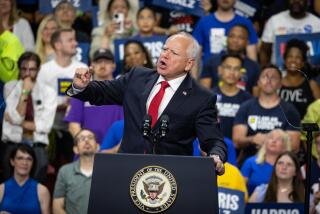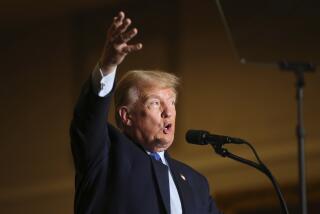Overdone outrage
- Share via
According to House Minority Leader John Boehner (R-Ohio), the Department of Homeland Security has defamed veterans of the U.S. armed forces by concluding in an internal memo that some returning service members might be susceptible to the propaganda of right-wing extremists. The Republicans’ manufactured outrage says less about the deficiencies of the document -- which are real -- than about the desperation of the Obama administration’s critics.
“To characterize men and women returning home after defending our country as potential terrorists is offensive and unacceptable,” Boehner huffed. “The Department of Homeland Security owes our veterans an apology.” The implication was that the memo suggests that most veterans are at risk for recruitment by illegal militias and domestic terrorists. Actually, the report (in its next to last section) warns of a repetition of events in the 1990s, when “a small percentage” of veterans joined extremist groups.
In that connection, the report mentions Timothy McVeigh, the Gulf War veteran who was executed for his role in the 1995 Oklahoma City bombing. That reference outraged David K. Rehbein, the national commander of the American Legion, who said: “To continue to use McVeigh as an example of the stereotypical ‘disgruntled military veteran’ is as unfair as using Osama bin Laden as the sole example of Islam.” Except that the report didn’t do that. It cited McVeigh as the most notorious example of extremism among some veterans, not disgruntlement.
Rehbein’s reaction can be attributed to apolitical oversensitivity and a justified impatience with the report’s thin documentation. Yet the memo’s conclusions are mostly common sense. In addition to warning plausibly that extremist groups will seek to recruit veterans, it notes that “right-wing chatter on the Internet continues to focus on the economy, the perceived loss of U.S. jobs in the manufacturing and construction sectors, and home foreclosures.” The notion that hard times can incite extremism is hardly novel, nor is the memo’s suggestion that the election of Barack Obama has inflamed white supremacists and should put the president’s protectors on guard.
The memo combines obvious observations with a lack of substantiation for its assertion that “the threat posed by lone wolves and small terrorist cells is more pronounced than in past years.” But it’s no broadside attack on veterans. So why do the Republicans rage? Could it be that, as in the attacks on Democrats for “not supporting our troops,” the party’s leaders are willing to exploit any opportunity to make the new administration look bad?
More to Read
Sign up for Essential California
The most important California stories and recommendations in your inbox every morning.
You may occasionally receive promotional content from the Los Angeles Times.










